50 Words or Less
The Titleist GT3 fairway wood delivers excellent versatility – off the tee, off the turf, and into the green. Lots of ball speed and strong forgiveness. Adjustable hosel and weight allow it to work for a wide variety of golfers.
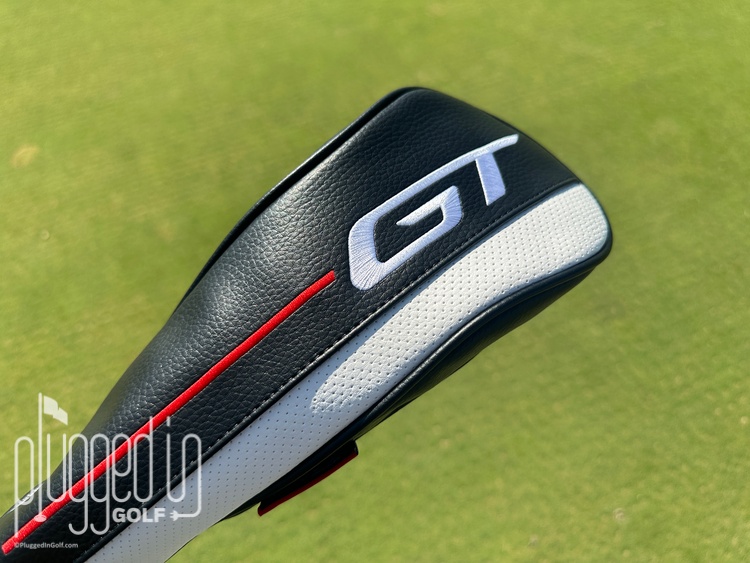
Introduction
Whether you’re looking for a traditionally lofted 3W or one of the trendier higher lofted fairway woods, most of us want versatility. Fairway woods earn their spot in the bag by providing a blend of distance and precision, value off the tee and for second shots. The new Titleist GT3 fairway wood has all that versatility with hefty doses of forgiveness and adjustability to boot.
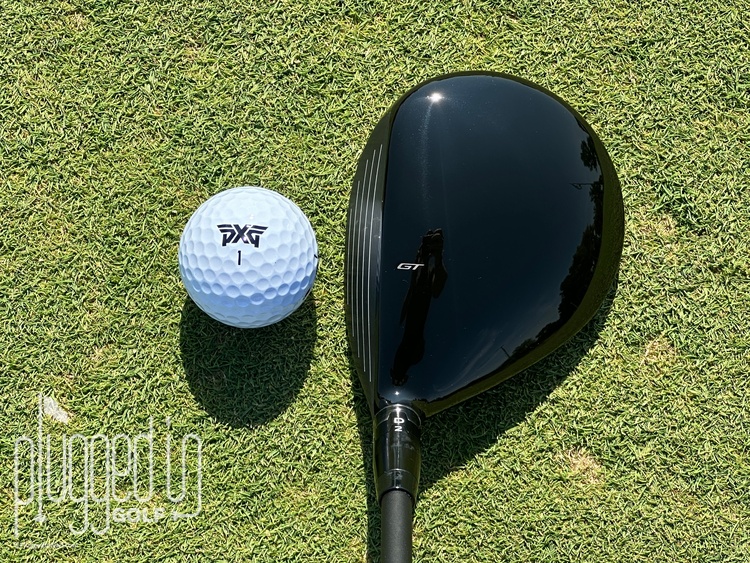
Looks
When a club is named “Generational Technology,” you might expect a look that’s dramatically different than what came before it, but that is not the Titleist way. The Titleist GT3 fairway wood still has the classic, traditional good looks that players expect from the brand. At address, the head is just below average in size with a slight pear shape, and the face is among the deepest or tallest I’ve measured. The gloss black crown is only interrupted by the small “GT” alignment aid because the Seamless Thermoform Crown leaves no trace, as the name implies.
In the bag, the GT3 fairway wood is even more understated than its predecessor. Almost the entire sole is black, with just a wisp of silver under the “GT3” branding. The SureFit Adjustable CG Track System is extremely subtle, masking the fact that this is a very adjustable club.
Comparing the Titleist GT3 fairway wood to the GT2 [review HERE], I found that they were more similar than different. There is a difference in volume – the GT2 is larger – but my eye felt that the difference was more in shape than size. The GT2 is closer to symmetrical with a little more bulk toward the heel than the GT3.
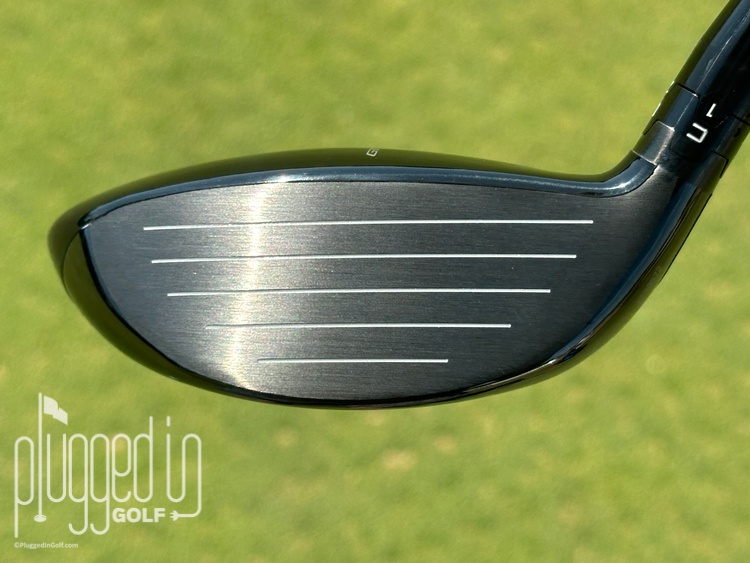
Sound & Feel
I loved the whisper quiet impact sound of the TSR3 fairway wood, and the Titleist GT3 fairway wood is just as understated. What has changed is that the GT3 has little to no metallic characteristic to the sound. It’s more “thud” than “tink.” This makes the audio feedback a little less obvious, but you can still hear a difference between pure strikes and misses.
The feeling of impact is solid more than anything else. You won’t need a launch monitor to tell you that this club is fast – the results speak for themselves – but the feel is more traditional than technological. Feedback through the hands is precise, as you would expect from Titleist. From the first swings, the GT3 fairway wood clearly let me know where the ball met the face.
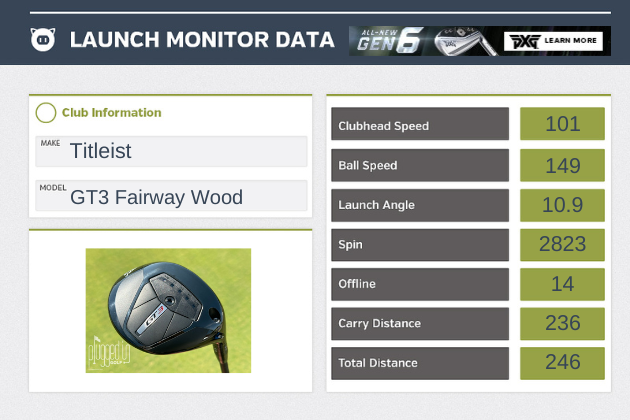
Performance
Regular readers may know that this is the first season that I’ve carried a fairway wood in my bag [full WITB HERE]. Historically, I haven’t carried one because I hit them too low to be useful. However, during my Titleist fitting, I found I was actually hitting my gamer a bit too high with too much spin to optimize distance. This was unexpected, but it’s why it’s important to check on your clubs regularly.
With the Titleist GT3 fairway wood, I saw a much more penetrating ball flight with lower spin. Per Titleist, the GT3 FW is “High” launch with “Mid” spin. Personally, I would rate the GT3 FW as mid launch with mid-low spin, but I’m a lower launching, lower spinning player. As always, your mileage may vary, so it’s important to be fit. Regardless, this stronger ball flight paired with excellent ball speed to help me pick up substantial carry distance during my fitting.
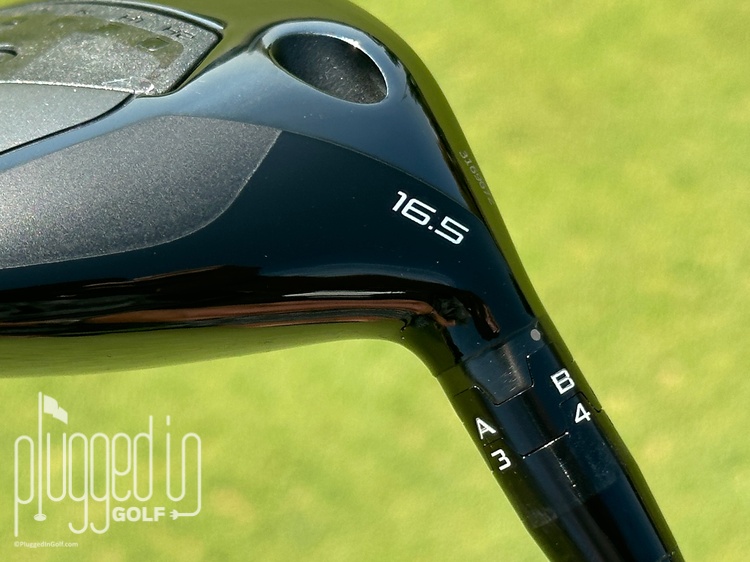
In further testing of the Titleist GT3 fairway wood, what impressed me is the consistency of the launch. Most players struggle with fairway woods because they launch them too low, and that certainly applies to me. Though the GT3 has a very tall face and a strong ball flight, the Forged L-Cup Face and weight saving from the Seamless Thermoform Crown work together to elevate even thin strikes to playable trajectories. I had no problem hitting the GT3 FW, even off bare lies.
Comparing the GT3 to the GT2, Titleist rates both heads as “High” launch, but the GT2 has lower spin. They also state that the GT3 is “Workable” where the GT2 is “Forgiving.” While this isn’t wrong, I don’t think the difference is that black and white. Both heads have good ball speed consistency across the face. For me, the biggest difference is that the GT2 has a little draw bias; the GT3 feels more neutral.
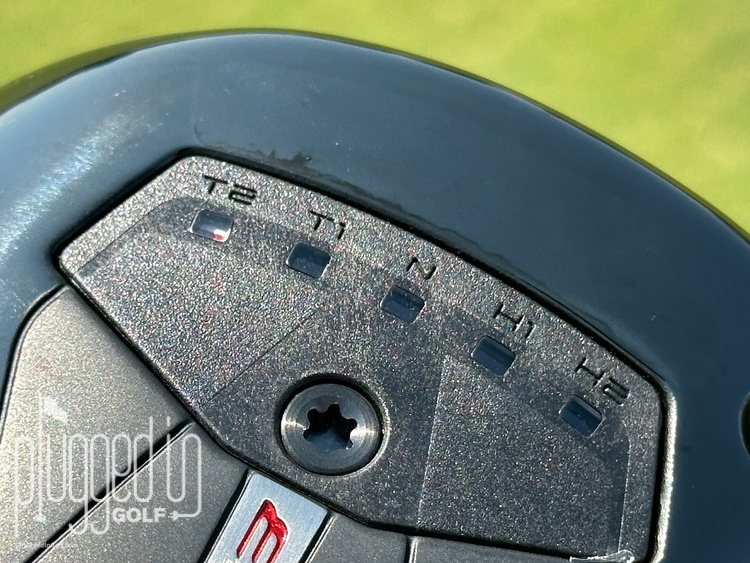
Another advantage of the Titleist GT3 fairway wood is the enhanced adjustability. Both the GT2 and GT3 have Titleist’s 16-position SureFit Hosel which allows for extensive loft, lie, and face angle adjustments. To that the GT3 FW adds a “refined” SureFit Adjustable CG Track System that has five positions. As with the TSR3 fairway wood [review HERE], this makes a noticeable impact on ball flight, but it’s not going to single-handedly fix a big hook or slice.
In sum, I think the Titleist GT3 fairway wood is highly versatile and surprisingly forgiving. This club can work for players off the tee and off the turf, and it can straighten out moderately crooked shots in either direction. While it’s not a club for high handicap players, I think it’s something that any mid-handicap or better golfer should test.
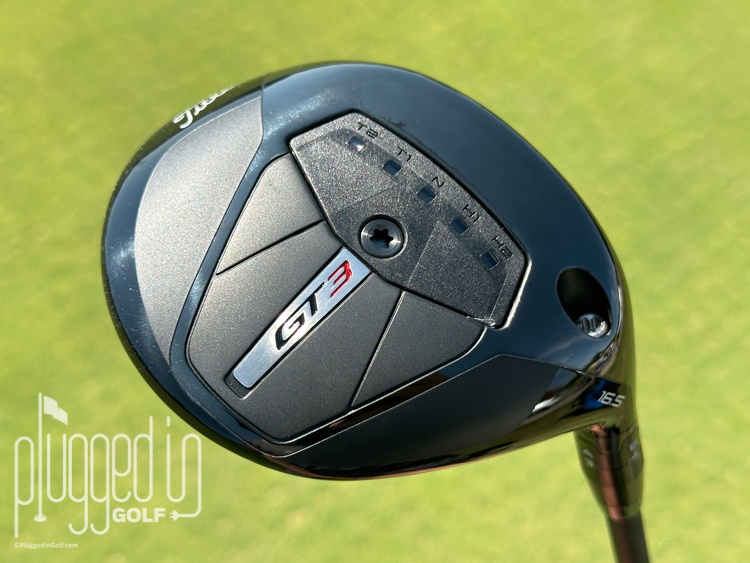
Conclusion
It would be easy to see the Titleist name and the clean address look and think that this club is for Tour use only. And it would have been easy for Titleist to make that club. Instead, the Titleist GT3 fairway wood is a club with classic looks and modern, versatile, forgiving performance. If you need a new long game option in your bag, this is worth a serious look.
Support Plugged In Golf, Buy HERE
Titleist GT3 Fairway Wood Price & Specs
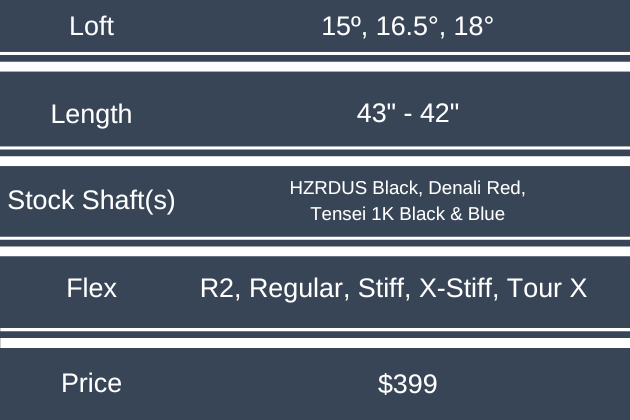
He founded Plugged In Golf in 2013 with the goal of helping all golfers play better and enjoy the game more.
Matt lives in the northwest suburbs of Chicago with his wife and two daughters.
- Performance Golf Click Stick Training Aid Review - October 18, 2024
- Callaway Opus Platinum Wedge Review - October 17, 2024
- When to Take a Break from Golf - October 15, 2024


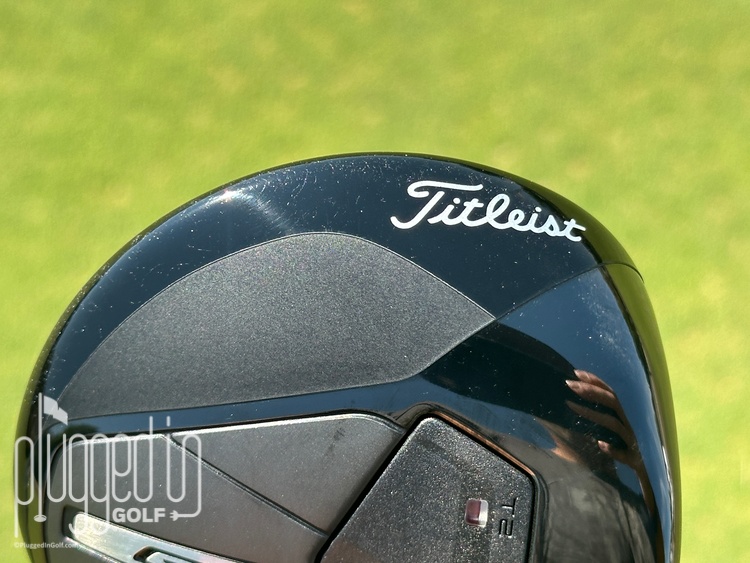
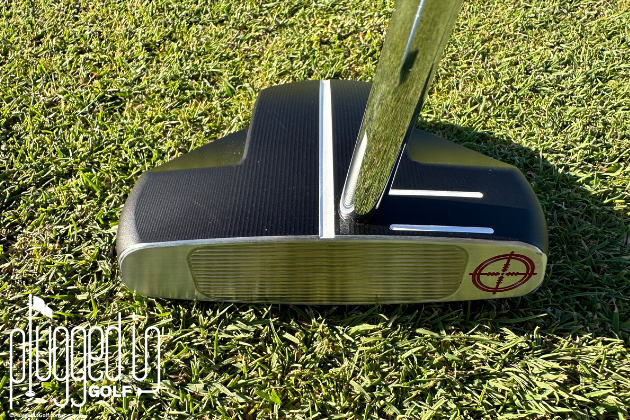
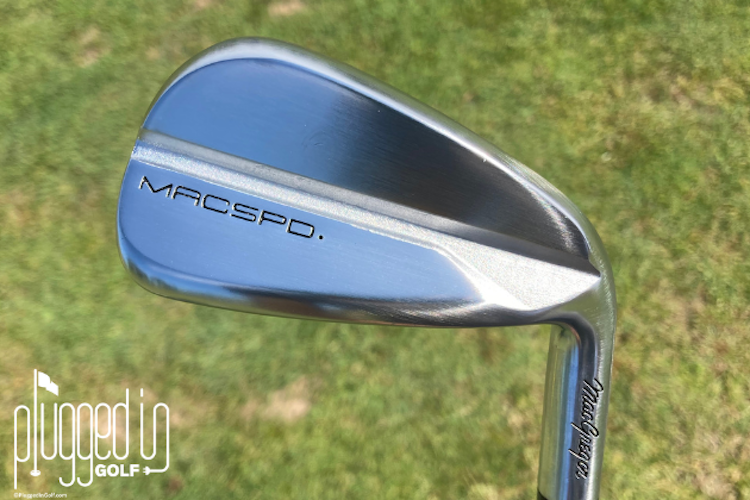
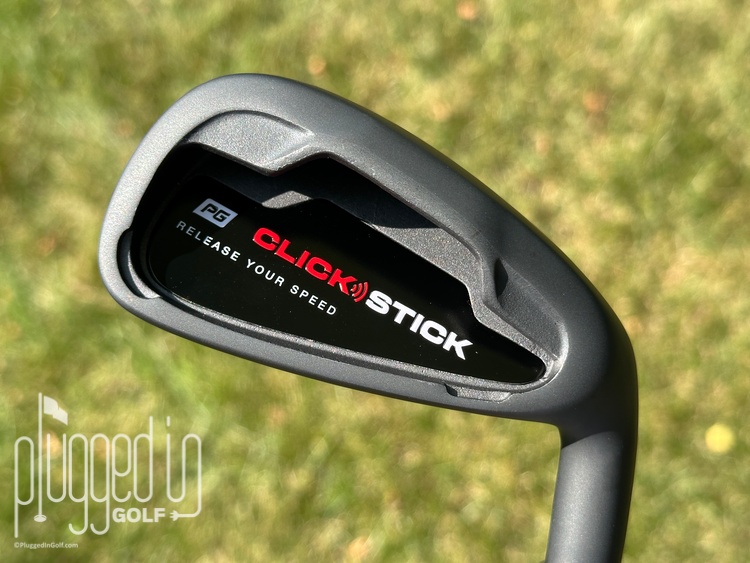









4 Comments
Great review, as always. Will you be putting this 16.5° straight into the bag? If so, with what shaft?
Steve,
I was fit for the Project X HZRDUS Black. I’ll be doing more testing before making any decisions on the bag. The distance gains in the fitting were compelling but I need to confirm two things: 1) that the distance gains are “real”/consistent and 2) that I can hit the GT3 as consistently well as my current gamer.
Best,
Matt
Ooh..love the look of that GT3, and that they’ve put that adjustability slider on it. Too bad the GT2 doesn’t have that as well. Interesting you mention your current fairway wood has shown too much spin for optimal distance? I played a Black Ops 15* 3 wood for a while this year and loved it for ease of launch and nice footprint for confident tee shots..but in the end it was proving to be too similar in results to my 5 wood and I’d rarely carry both for that reason. The smaller head of my 5 wood was more versatile from different lies ..so the Black Ops eventually went away. Still .. one of the more forgiving 3 woods I’ve tried in many years and felt great! If these new GTs are in the ball park with even better distance, they should be huge sellers.
I got the same results as you with my GT3 test.. 235-240 carry, 149-150bs, 3000-3200 spin , 40-42 decent. I went with GT2 fairway to start- just going with what was my fit in the past. I happened to hit the GT3 with same shaft one day on a range and noticed what felt like more controlled straight flight for me. Then I got on TM and saw a little more BS and straight flight dispersion. I have both heads and like them both but the GT3 is my gamer currently. My miss is a pull so the GT3 is more helpful. I’ve got a Ventus red TR 7s & Tour Ad DI 7s. I prefer the tour ad di for the GT3. 🚀 launches in that 12dg range and seems to stop faster when I test into greens. Compared to other shafts. Awesome fairway imo.